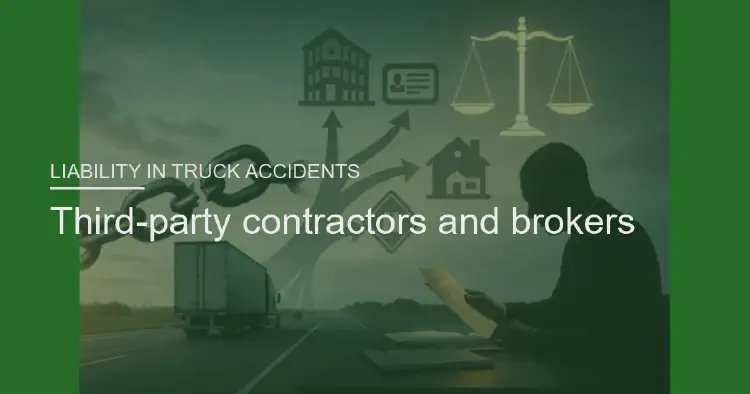Third-party contractors and brokers
The trucking industry often relies on a web of third parties, including contractors and freight brokers. When these entities play a role in unsafe practices or negligent decisions, they too may be held liable in truck accident cases.
- Truck Accident Law Team
- 2 min read

Third-Party Contractors and Brokers Liability in Truck Accidents
Who Are Third Parties in Trucking?
-
Freight Brokers
- Middlemen who connect shippers with trucking companies.
- Responsible for selecting qualified carriers.
-
Independent Contractors/Owner-Operators
- Drivers who own and operate their own trucks but haul for larger companies or brokers.
-
Cargo Loading Contractors
- Third parties hired to load and secure goods onto trucks.
-
Maintenance Contractors
- Outside mechanics or shops performing repairs and inspections.
Grounds for Liability
-
Negligent Selection by Brokers
- Hiring or dispatching unsafe or unqualified carriers.
- Failing to verify FMCSA safety ratings or insurance coverage.
-
Improper Loading by Contractors
- Overloaded or unsecured cargo leading to rollovers or spills.
- Violations of FMCSA cargo securement rules.
-
Negligent Maintenance
- Faulty repairs or skipped inspections by outside shops.
- Using substandard parts that cause equipment failures.
-
Misclassification Issues
- Sometimes companies label drivers as “independent contractors” to avoid liability.
- Courts may look beyond the label to determine true responsibility.
Evidence Used in Litigation
- Contracts between trucking companies and brokers/contractors.
- Safety rating records and carrier vetting documents.
- Cargo manifests and weigh station logs.
- Maintenance invoices and inspection reports.
Legal Significance
- Extending liability to brokers and contractors helps ensure victims can access compensation from all responsible parties.
- Courts may apply principles of joint and several liability, allowing plaintiffs to recover damages from multiple defendants.
Summary: Third-party contractors and brokers play critical roles in trucking operations. When they fail to ensure safety—whether through negligent hiring, improper loading, or poor maintenance—they may be held liable alongside drivers and trucking companies in accident cases.
You might also like:
- Tags:
- Trucking Companies
- Truck Accidents
- Insurance Coverage
- Legal Significance
- Poor Maintenance
- Negligent Hiring
- Cargo Securement
- Inspection Reports
- Liability Truck
- Ensure Victims
- Improper Loading
- Maintenance Contractors
- Responsible Parties
- Violations Fmcsa
- Negligent Maintenance
- Evidence Used
- Logs Maintenance
- Securement Rules
- Plaintiffs Recover
- Cargo Securement Rules
- Plaintiffs Recover Damages
- Drivers Trucking Companies
- Evidence Used Litigation
- Helps Ensure Victims
- Liability Truck Accidents
- Victims Access Compensation